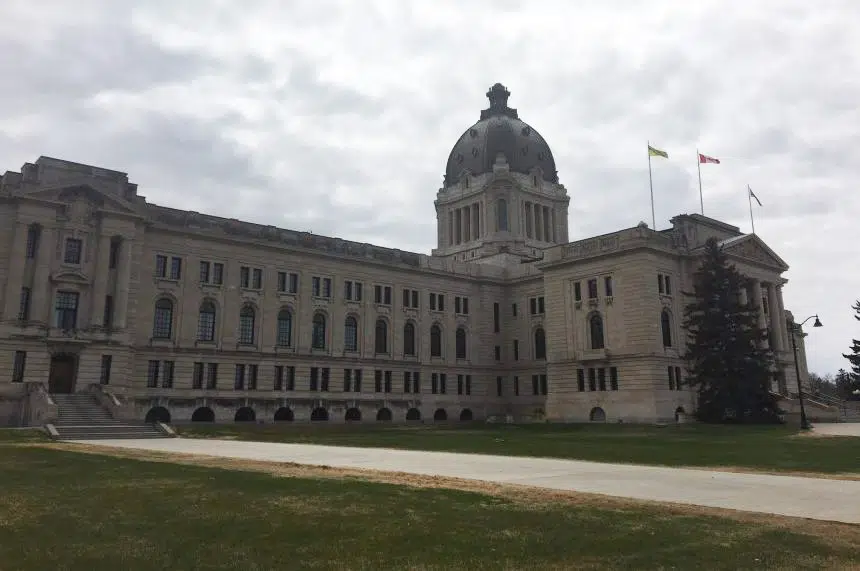The fall session of the Saskatchewan legislature kicked off on Wednesday with Premier Scott Moe’s first throne speech.
It laid out his government’s agenda for the year ahead, focusing on priorities including the economy, rural crime and “standing up for Saskatchewan” against the federal carbon tax.
Moe is confident in delivering a balanced budget for 2019-20 as the province continues to deal with challenges such as the carbon tax, U.S. trade sanctions on the steel and uranium industries and lower resource prices.
“It isn’t going to be easy and there are still some difficult decisions that will have to be made this coming year,” Moe said.
The premier explained he’s keeping a close eye on the energy industry and is seeing increased activity as capacity builds.
Moe’s plan includes expanding existing incentives and introducing new oil well drilling and production incentives. That includes a new Saskatchewan Technology Startup Incentive, a non-refundable tax credit to encourage investment in early-stage technology companies.
Safer communities
The Moe government plans to amend The Police Act to allow rural municipalities and small communities with a population under 500 to join regional police services.
“When it comes to how we address crime in our province and our communities, everything is on the table,” Moe said.
The Premier would not say yet which police services the province is looking at or if more funding would be made available to those services.
Legislation will be introduced to address trespassing laws and the rights of rural land owners. Work will also continue to improve response times in rural areas by using the Protection and Response Team (PRT) which was launched in April
There’s a focus this session on safer roads across Saskatchewan. The government plans to increase funding to improve intersection safety and will also improve commercial driver training. This was highlighted after the deadly Humboldt Broncos bus crash, although Moe said this work started prior to the tragedy.
“We will be looking to move forward with a new course, new training standards and parameters in the very near future,” Moe said.
Healthcare and Education
The throne speech spoke to many accomplishments and past plans that will come to fruition.
It pointed to the government’s two-for-one MRI policy, creating the Saskatchewan Health Authority, a commitment to reduce emergency room wait times and the Jim Pattison Children’s Hospital in Saskatoon which is expected to open in 2019.
On education, Moe pointed to the $30 million in funding restored to hire up to 400 teachers and support staff.
His speech also mentions the development of new curricula in financial literacy, which will be piloted in Saskatchewan schools in 2019.
Clare’s Law and Sixties Scoop apology
Some of the other plans for the near future include becoming the first province in Canada to pass Clare’s Law. It’s named after a woman who was murdered by her partner and did not know about his violent history.
This new law will help protect domestic violence victims and allow people to ask police services to disclose information about an abusive partner’s past.
The Moe government is also planning a long-awaited apology to Sixties Scoop survivors after one was promised by former premier Brad Wall but never happened.
NDP says throne speech shows lack of new ideas
When the NDP looks at the promises made in the throne speech, it doesn’t see much of anything new.
Leader Ryan Meili said the premier missed out on a big opportunity to show off his ideas, calling the throne speech “extremely thin on vision.”
“People are out of work. Our economy is struggling. You see spin about the last ten years but no acknowledgement of what people are really dealing with today,” Meili said.
Meili said most of the items mentioned in the throne speech were announced months or even years ago, calling them recycled.
“That certainly doesn’t give a sense that we have a new premier with a new vision.”
The NDP leader is also concerned about rural crime and agrees in the need to address the issue. However, Meili said Moe’s plan focuses on small measures in response to crime but no focus on what causes it.
“Crystal meth is a huge problem and it’s fueling a lot of (crime) and that’s obviously tied to poverty,” Meili said.
Meili said the NDP will be putting forth some of its ideas in this fall session on what can be done to improve the economy and invest in health and education.











